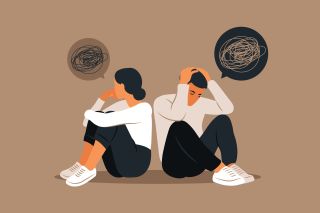Relationships
When You and Your Partner Feel Like Roommates
The pattern of mutual withdrawal and how couples can break it.
Updated May 2, 2024 Reviewed by Devon Frye
Key points
- When partners feel like roommates, it's a sign of a pattern of mutual emotional withdrawal.
- Instead of leaning on each other, partners have been going to their separate corners, being hyper-independent.
- To break this pattern, partners need to learn to take emotional risks: sharing their feelings and needs.
- Withdrawing behavior is rooted in childhood, but we can learn to turn towards others in adulthood.

You and your partner hardly ever fight, but something is missing in your relationship—a sense of being lovers, of passion, of emotional intimacy, of closeness. The pain of missing out on a deep love that feels just out of reach is heartbreaking. And since there are no arguments, no clear history of relationship problems to point to, you’re left wondering, “How did we get here?”
So, How Did We Get Here?
There is an answer to that question. What’s happened here is a pattern of mutual withdrawal.
Instead of having the tough conversations, both partners have learned to shut down their own needs or become “self-sufficient” instead of turning to each other for contact, care, and comfort. Over time, this has led to a pattern in which neither partner leans on the other for their attachment needs to be met, leaving both partners with unmet needs in the relationship.
And the more that needs for closeness go unmet in the relationship, the more each partner learns to cope by turning away. The thinking is, “When I don’t get what I need, I take care of myself.” However, this creates a culture of distance in the relationship; all of a sudden, turning towards each other, leaning on each other, and expressing affection become awkward.
Being stuck in a withdraw/withdraw pattern in a relationship leaves both partners feeling lonely. Without intentional change, these couples tend to become more distant over time, because the more alone that partners feel, the more they will withdraw into themselves and away from the relationship. It’s a silent snowballing of emotional distance in which each partner retreats to their own corner of the house, leaving it empty of the love and laughter that each longs for.
How Do We Get to Feeling Like Lovers Again?
Inside partners who are disengaging from the relationship is oftentimes a fear of not being loved, accepted, and responded to. People who learn to withdraw may have grown up in homes in which they were shamed or punished (however covertly or subtly) for their feelings and for having needs of their own. When under stress (think “fight or flight” response), flight seemed like the best option.
The result is an adult who has become hyper-independent rather than adept at sharing feelings and asking others for their needs to be met. Due to early childhood experiences of their feelings being invalidated and their bids for connection being unmet, they may think something like, “What’s the point in sharing how I feel or that I want more closeness? It will only backfire if I do.”
Because what’s happening in your relationship is that both of you are turning away, withdrawing into yourselves, the antidote to this pattern is to turn toward each other. You need to start relying on your partner for contact, care, and comfort rather than doing what feels comfortable to you (trying to do it all yourself and meet your own needs). The truth is, you can’t meet your own needs for social support and love; these are natural human needs that can only be met by others.
If you want to break this pattern and feel closer to your partner, you need to stop avoiding tough conversations. You need to start opening up about your feelings and needs.
When you recognize that you are pulling away from the relationship, develop a habit of starting to look inward at what feelings underneath are causing you to pull away. If you allow yourself to fully feel it, you may notice a fear of not being good enough or being inadequate in some way, or a fear that you are not worthy of voicing your relationship needs and having them be met by someone else.
When you recognize these feelings, notice that they are like a “check engine light” on a car, telling you that you need something important from your partner. Don’t try to fix the car yourself, but instead ask for their help.
Your feelings tell you that you need to feel accepted for who you are, loved, and like you matter. Turn to your partner and tell them.
This could sound something like, “I’ve noticed that I have been going into my corner lately. I want to break our pattern and share how I’ve been feeling. What I’m recognizing is that I’ve been feeling inadequate lately because I’ve been seeing you going into your corner too. I miss you, and what I think I need is some time with you tonight. Could we spend the evening together?”
If you and your partner are finding yourselves caught in a pattern of mutual withdrawal, know that there is so much hope for you two. You are likely both gentle, kind souls who value harmony—in fact, that may be the entire reason you have found yourselves here. This is a strength, just one that needs to be balanced with risk-taking and “turning the volume up” on emotional sharing and mutual reliance in the relationship.
You two can start to learn to turn toward each other. Show your partner that it is safe to lean on you for emotional support and care, and ask that your partner do the same.
References




